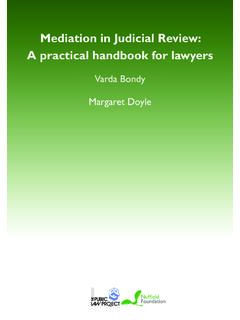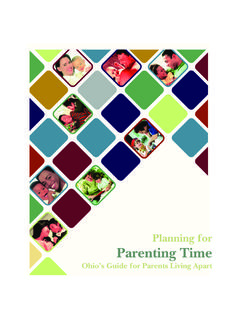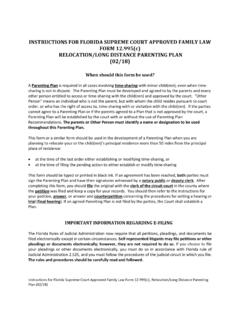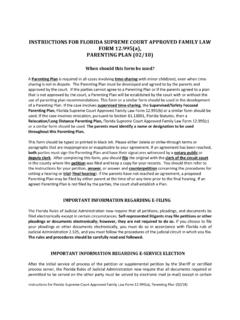Transcription of FAMILY POLICY BRIEFING 7 Caring for children after ...
1 FAMILY POLICY BRIEFING 7 ISBN 978-0-9562623-2-5 HOUSE32 WELLINGTON OX1 2 ERTEL 01865 270325 FAX 01865 of Social POLICY and InterventionCONTENTS May 2011 Introduction 1 Background 2 When do children with separated parents do best? 3 Workable shared time: what helps? 3 When is shared time difficult for children ? 8 Shared finances and shared parenting ? 9 Legislating for shared parenting time: The Australian experience 10 Questions needing further information before considering legislation 13 References 14 Summary 16 This paper was written by Belinda Fehlberg and Bruce Smyth with Mavis Maclean and Ceridwen RobertsCaring for children after parental separation: would legislation for shared parenting time help children ?
2 IntroductionIn recent years, interest in sharing parenting has grown among parents who no longer live together, following divorce or separation, but where both wish to spend time with their children . Shared time is different from and additional to sharing legal responsibility. But as well as this informal development arising from agreements made between separating parents, there are now demands for legislation to promote shared parenting in cases which go to the FAMILY courts. This is due in large part to growing pressure from fathers July 2010, Brian Binley MP introduced a Private Member s Bill, the Shared parenting Orders Bill, to provide for the making of shared parenting orders for litigating parents who could not agree about parenting arrangements. This bill aims to create a legal presumption that shared parenting orders should be the default arrangement unless certain exceptions apply.
3 It will be debated in the House of Commons later this summer. More recently, at the end of March 2011, Charlie Elphick MP introduced a second Private Members Bill, the children s Access to Parents Bill which had some comparable part of its work, the Ministerial Task Force on Childhood and the FAMILY is looking at various ways of encouraging agreements about shared parenting and the FAMILY Justice Review s interim report this spring, also considered the issue. However the report argued no legislation should be introduced that creates or risks creating the perception that there is an assumed parental right to substantial shared or equal time for both parents .This paper starts from the viewpoint that evidence fully supports the benefit to children of having a meaningful relationship with both parents after separation.
4 The great majority of separating parents make their own arrangements for their children without reference to courts or lawyers. The minority who cannot agree and seek legal help are encouraged to negotiate or mediate and reach an agreed solution. If they are unable to do so and ask the court to make a decision, currently this decision will be taken according to the children Act 1989, with the welfare of each individual child as the paramount consideration in making any purpose of this paper is to examine the state of knowledge about legal ordering of shared parenting . The aim is to inform debate about whether additional legislation promoting shared parenting time would be helpful to the children of the small group of parents who are highly conflicted and often have many other difficulties.
5 Mothers and fathers who make consensual private arrangements would not be directly affected. Particular attention is given to recent research from Australia, where FAMILY law reform in 2006 has moved towards much greater emphasis on encouraging shared FAMILY POLICY BRIEFING 7 Legislating to encourage shared timethough there are other variants one week with mother, the next with father. It requires a considerable degree of co-operation between separated parents to maintain this arrangement satisfactorily and like all arrangements it is liable to need re-negotiation as children get older and needs of children and parents change. It is sometimes argued by non-resident parents that this split is fairer to children and parents especially non-resident parents (mostly fathers).
6 But is a proposal which is advanced to remedy the injustice and pain felt by some non-resident parents right for children , whose interests under current law are paramount? What are the implications of legislating that this should be the default option for parents who cannot reach agreement but instead litigate to seek a decision from a FAMILY court? Legal regulation of shared parenting is currently rarely needed, because most parents who make these arrangements have done so by agreement. In contrast, parents who seek an order from the court are inevitably those with the highest levels of conflict and have not been able to reach agreementAll this makes any proposal to legislate for shared parenting time for litigating parents a highly charged and contested issue. It is also a very important issue as any legislative change, however subtle, may have far-reaching consequences for all children and their separating parents, since parents often reach agreements in the shadow of the law , as advised by solicitors.
7 More broadly, separating parents ideas about how to arrange their parental care could be affected if new legislation were to be framed in terms The current legal position The present legal position in England and Wales is set out in the children Act (England and Wales) 1989. This requires any court making a decision affecting the care and upbringing of a child to give paramount consideration to the welfare of that child. The issue of having any presumption about contact was discussed in Parliament in 2006 in relation to the children and Adoption Act. The government, after extensive discussion of the research evidence, took the view that the paramount principle of the welfare of the child of the children Act should be upheld: that is, each case should be considered on the facts and any decision should be made in the best interests of that child at that time.
8 The children Act also requires that a court should only make an order where it is in the interests of the child to do so. Parents retain their legal parental responsibility after separation. They are expected to make their arrangements privately, and not to seek an order from the courts about their arrangements for their children unless they are in an intractable dispute. The Consultation Paper 10/12 issued by the Ministry of Justice in January 2011 proposes removing contact and residence cases from the scope of legal aid except where parties are involved in domestic violence proceedings. This means parents will either arrange matters themselves, litigate in person or pay for legal advice. Lack of legal aid is likely to have a differentially adverse impact on mothers who typically have lower incomes than fathers to pay for legal advice and heavier child care shared parenting Definitions of shared parenting time vary widely.
9 In the UK shared parenting generally refers in debates to an equal division of time of children with either parent. It has no legal status and is totally different from the legal term, parental the US (where much of the relevant research has been conducted) the terms joint physical custody , dual residence , alternating residence , and shared physical placement , are all used to describe shared time arrangements. But these rarely mean 50/50 timeshare arrangements instead, the research generally defines shared parenting time as an arrangement when children are with each parent between 30% and 50% of the time. Australian legislative and research definitions of shared care reflect a similar range of time-sharing arrangements. The FAMILY Law Act 1975, refers to equal time but also to substantial and significant time which does not require equality to mean shared care.
10 Most of the recent Australian research defines shared care as children spending 35-65% of nights with each way in which shared care is defined is important, not least because prevalence is affected by the definition adopted. For example, prevalence will be higher if shared care is defined as each parent having care of the child for at least 35% of the time, rather than meaning there must be a 50/50 split. Prevalence will also be higher if the definition is cast in terms of time overall rather than just after separationAfter their parents separation, most children spend time with each parent by some sort of mutual agreement about arrangements. Almost all parents find it difficult to make and/or maintain these arrangements but in only a small proportion of cases [10%] are the courts , most children spend a majority of their time with one parent, usually the mother, called the resident parent.















